Theatricality, Collaboration, Compassion Drive Theatre Professor Cláudio Medeiros’s Work in the Classroom and On Stage
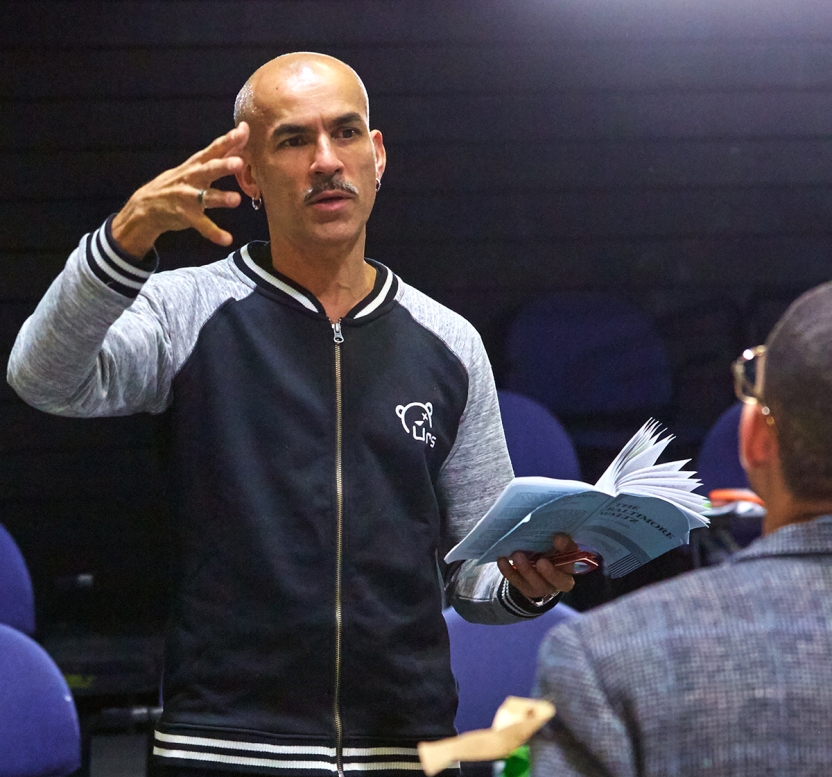
MIDDLEBURY, Vt. – Seeler Studio Theatre resounds with the irresistible beat of the B-52s’ “Love Shack,” as rehearsal kicks off with a high-energy dance party.
“We always start with a very gay piece of music,” says theatre professor Cláudio Medeiros ’90, who explains that ’80s hits like “Love Shack” and pride anthems like “I Will Survive,” “Dancing Queen,” “It’s Raining Men,” and “Vogue” provide both warm-up and cultural context for his upcoming production of Paula Vogel’s The Baltimore Waltz, set during the AIDS crisis of the 1980s and 1990s.
“It’s a way of reminding ourselves that this play is about a topic that was—and is—absolutely devastating, but there is still so much to celebrate,” said Madeleine Russell, a senior and theatre major, who plays the character Anna.
The Baltimore Waltz premiered in 1992, the year in which AIDS became the United States’ leading cause of death for men ages 25 to 44. Vogel wrote the play shortly after her brother Carl died from AIDS in 1988. Two years earlier, she’d declined to join him on a trip to Europe, “never dreaming that he was HIV positive.” In the play, Vogel takes siblings Anna and Carl on the tour of Europe she and Carl never shared.
Medeiros said he’d wanted to direct The Baltimore Waltz since seeing a student production many years ago.
“It left a mark. I remember being very moved by it, being entertained by how funny it was. Reading it again, I was just really amazed at how unique a way of telling a story it is—just how smart, how quirky… . The play is so generous, so full of compassion.”
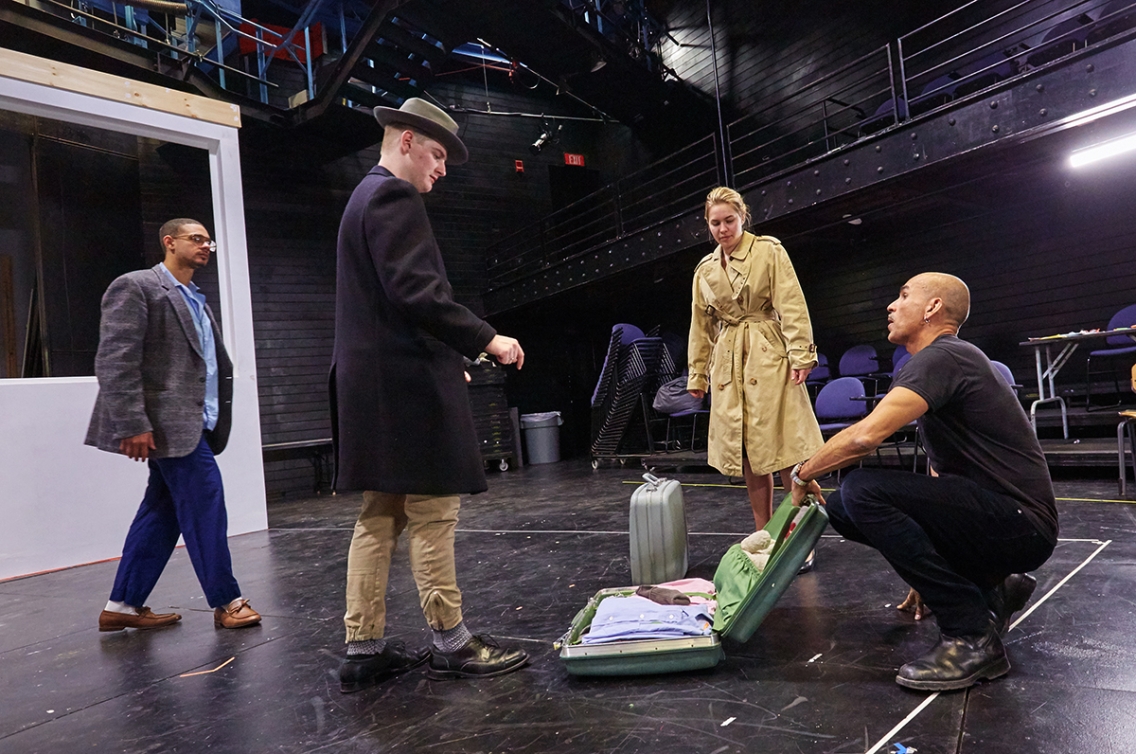
Associate Professor Cláudio Medeiros works with Ryan Kirby ’22 in a scene from The Baltimore Waltz. Far left: Alexis De La Rosa ’19; center right: Madeleine Russell ’19.
2019 is also significant culturally and historically, Medeiros observed: this June marks the 50th anniversary of the Stonewall Uprising. To provide greater context about the AIDS crisis itself, alongside The Baltimore Waltz production members have organized a showing of the documentary How to Survive a Plague, a talk by longtime AIDS activist Terje Anderson, and a library exhibit on the AIDS crisis and gay life at Middlebury during the 1970s and 1980s.
Vogel—winner of the Pulitzer Prize and Susan Smith Blackburn award, among numerous other honors—is known for her take-no-prisoners approach to playwriting. The Baltimore Waltz unfolds in 30 scenes, ranging from a hospital room in Baltimore to iconic settings in Paris, Amsterdam, and beyond. Besides central characters Carl and Anna, an additional dozen characters are played in whirlwind succession by two other actors.
“It’s a playground for actors,” said Medeiros. “The play is simply delicious to work on.”
Vogel transmutes the rage, fear, and tragedy of the early AIDS crisis—the scientific jargon, the predatory quack doctors, the sanctimonious public pronouncements, the frustration of not knowing what, exactly, was killing healthy young men nor how it was transmitted, the homophobia—into a through-the-looking-glass world in which AIDS becomes the fictional “Acquired Toilet Disease” and the victim not Carl but Anna.
Medeiros said that in many ways The Baltimore Waltz bookends his first production on campus as a visiting guest artist 21 years ago: Execution of Justice, Emily Mann’s examination of the trial of Harvey Milk’s murderer. Elected to San Francisco’s Board of Supervisors in 1977, Milk was one of America’s first openly gay elected officials.
“I remember at that time that my identity in that rehearsal room with the students was centered around my being a very open gay man and wanting to give voice to the story of Harvey Milk. And it’s interesting that many years later, I’m still finding myself emotionally connected to this project in some part because of that. Because this is a story that touches me on a very personal level.”
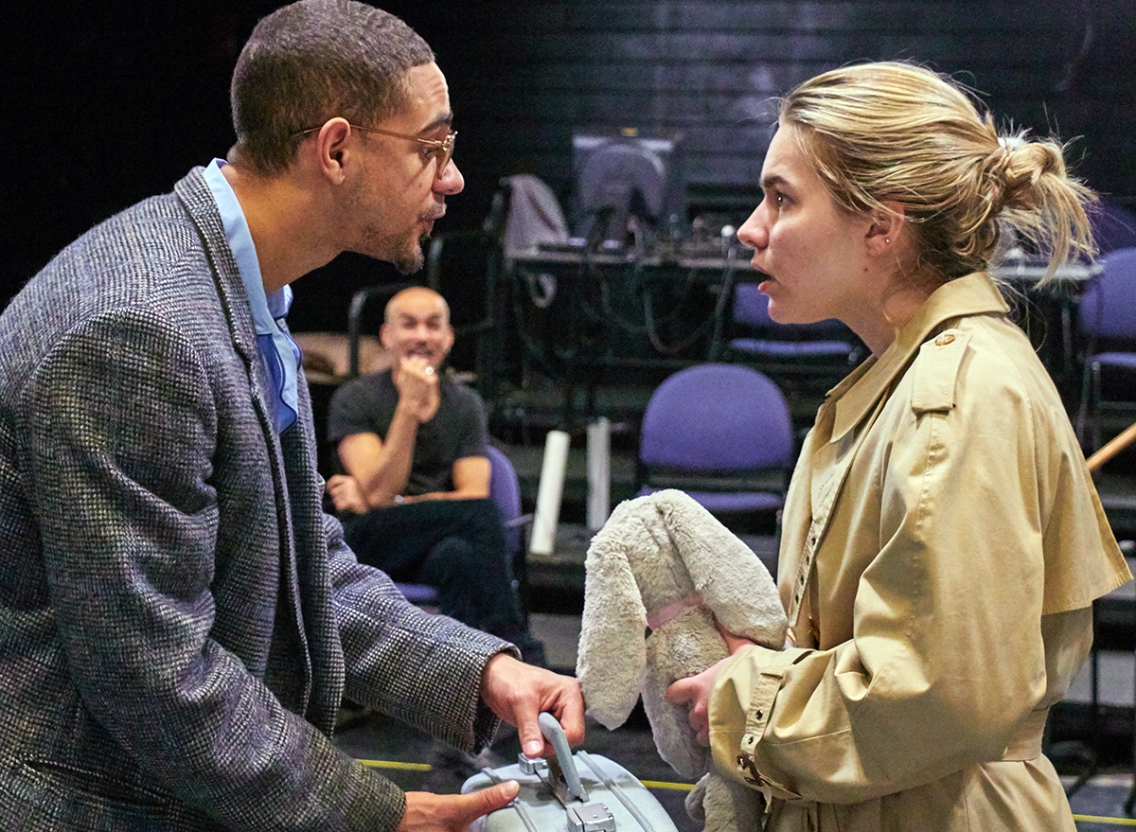
Alexis De La Rosa ’19 and Madeleine Russell ’19 rehearse a scene from The Baltimore Waltz at Seeler Studio Theatre.
Medeiros grew up in Brazil’s Northeast Region, finding some of his happiest moments in making theater. After graduating from high school, he began medical school (students in Brazil go right into professional training, he explained).
“I always knew I loved theater, but I never thought of it as a career because in my part of Brazil, in those days, that was not really an option. I was a very good student. So, I was hearing people talk about me as somebody who would go into medical school or engineering or law—that’s the ideology that I grew up in.”
Through an international exchange program, he interrupted his studies to live in the small farming town of Lewiston, Minn., then returned to Brazil.
“I did three more semesters of medical school and realized that my dream was not to become a doctor, that I wanted to come back to the U.S., go to a university, and study theater and French.”
Medeiros was accepted to Middlebury, where he graduated summa cum laude and Phi Beta Kappa in 1990. From there he worked at such places as the Williamstown Theatre Festival and Berkeley Repertory Theatre before getting a PhD in dramatic art from University of California, Berkeley.
“The collaborative nature of theater is absolutely intoxicating to me. I love being in a room with people and really being in a room with people,” said Medeiros.
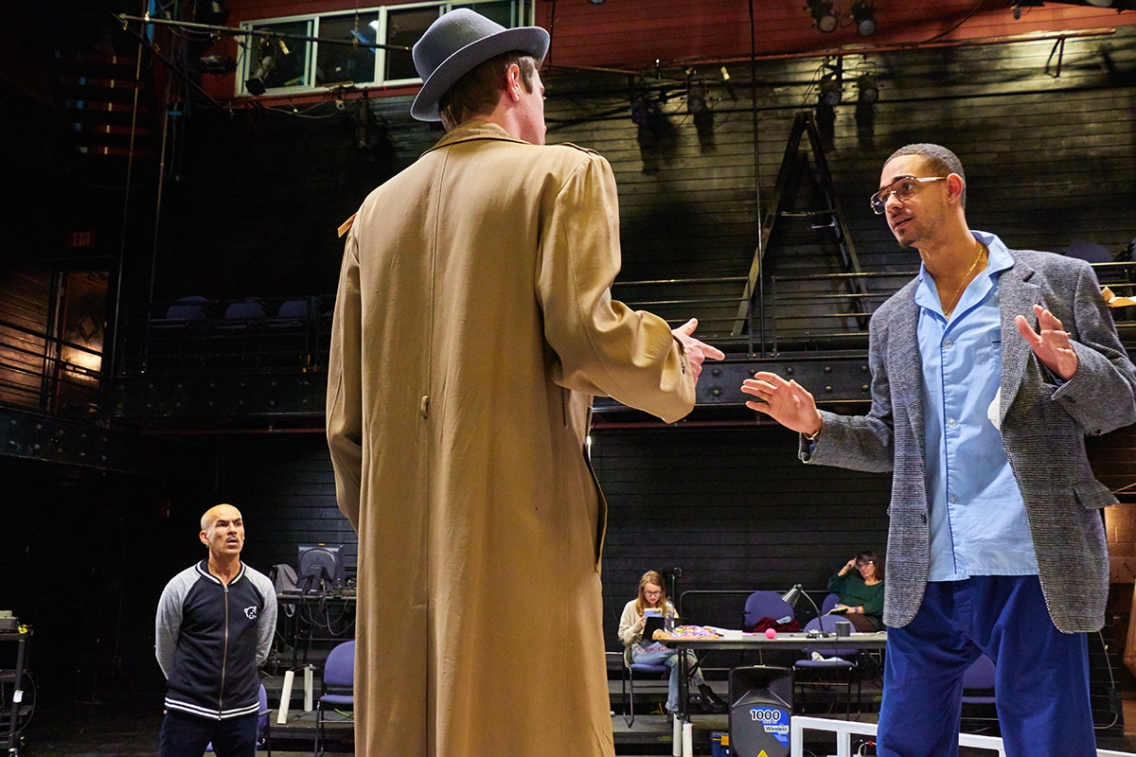
Alexis De La Rosa ’19, right, and Kevin Collins ’20 rehearse a scene from The Baltimore Waltz at Seeler Studio Theatre.
More than any other art form, Medeiros believes, theater builds empathy.
“Theater is about putting yourself in someone else’s shoes, telling a story in a way that is nonjudgmental, that presents the truth, the beauty and the ugliness of it, that makes room for an audience to exercise their own empathy and compassion.
“If you’re working with a good text, if you pair that up with a compelling performance, the fact that you’re putting your audience in direct, unmediated confrontation with human beings creates an opportunity that no other form can create: an opportunity for critical investigation and for the exercise of empathy, of understanding the other.”
Asked how he chose to become and remain an émigré, Medeiros said: “I think that leaving Brazil was a way to escape the oppression and homophobia that I grew up with.”
Coming to the United States offered “a chance to be fully myself, a chance to pursue an education that allowed me to study literature, theater, and languages.”
“I have a sense of gratitude to Middlebury and to the United States.”
After graduation, Medeiros returned to Middlebury, first as a guest artist, and then, in 2004, as a faculty member. As with most Theatre Department members, Medeiros teaches a range of classes, not only acting and directing but also theater history, theory, and dramatic literature. Recent offerings in dramatic literature include a course on postcolonial drama and the first-year seminar Sex and Power Onstage.
Theatre Department production designer Hallie Zieselman has collaborated with Medeiros since his first production as a faculty member in 2004. She’s also the set designer for The Baltimore Waltz.
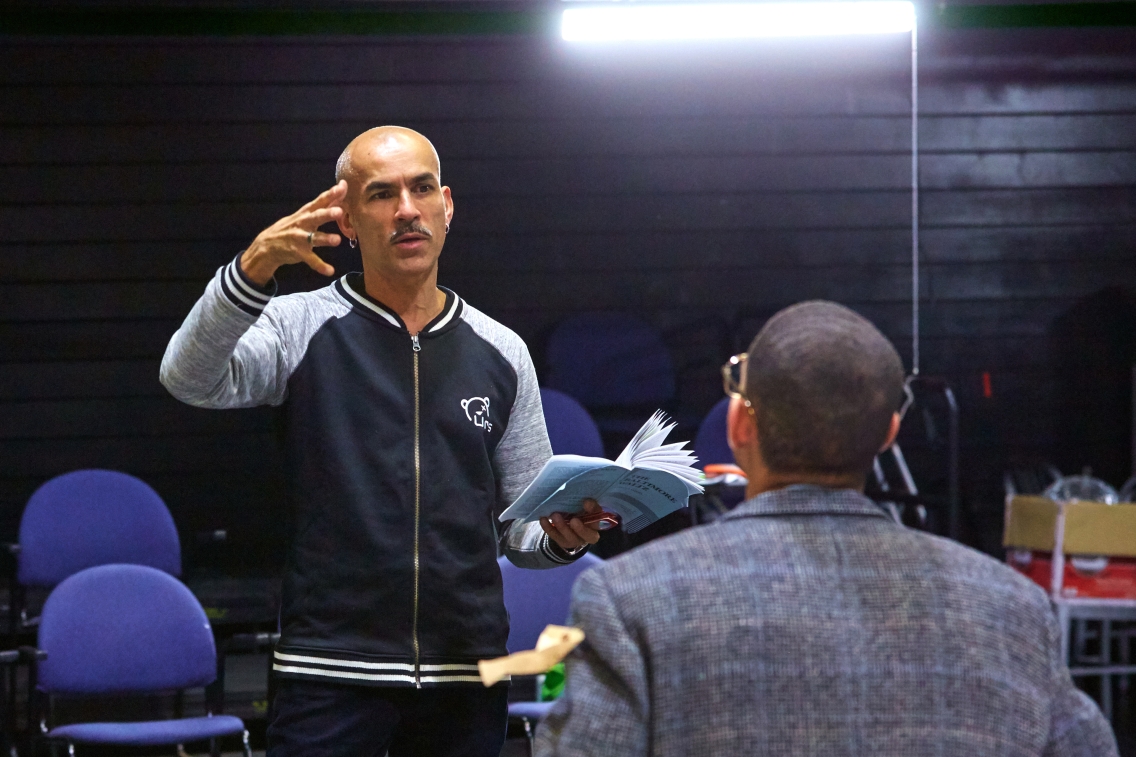
“One of the things I really appreciate about working with Cláudio is that he’s so collaborative—there’s a lot of flexibility to try things. We have a mutual trust in experimentation that always makes it exciting,” said Zieselman.
She also loves the range of plays he selects and the breadth of Medeiros’s theatrical imagination.
“Cláudio has a sort of dancer’s sensibility about design, he’s very visual,” she said.
For composer and music professor Su Lian Tan, Medeiros has been a key collaborator in the development of her opera Lotus Lives. He directed the first production at Middlebury in 2011, directed it again at Tufts, and in 2018 directed a production at the Théâtre Gesù in Montreal.
“He’s intense, painstaking, desirous of high nuance—and inspired,” said Tan.
For Tan, one of the most revelatory aspects of Medeiros’s direction was the performances he elicited from professional opera singers—whether in the mere two days of rehearsal for the 2011 performance or the more extensive rehearsal process for the Montreal production.
“I’ve been involved with the opera world for a very long time,” said Tan, “and what he brought out from Stéphanie [Québécoise mezzo-soprano Stéphanie Pothier], in terms of acting and nuance, was something that you don’t see very often.”
Senior Stephen Chen, lighting designer for The Baltimore Waltz and theatre and Japanese studies double major, said he first encountered Medeiros in his directing class.
“It’s a very intense class. He’s very enthusiastic,” said Chen. “He really drove home the idea that to direct a play you need to make sure that the audience understands everything. He really focuses on storytelling.”
Madeleine Russell says the professor’s class gives students an opportunity to work like professionals. “He treats us like equals, with the understanding that we’re coming in prepared and ready to do the work, and I really appreciate that.”
Medeiros’s honesty and support, said Russell, also gives student actors room to make courageous choices, whether they succeed or fail.
“He’s seeing everything that’s happening, and we know he has our back. We can make choices that might not necessarily work in the final product, but we are given the freedom to do that because we know he will be there to tell us or to adjust us. He is watching and rooting for us the whole time.”

